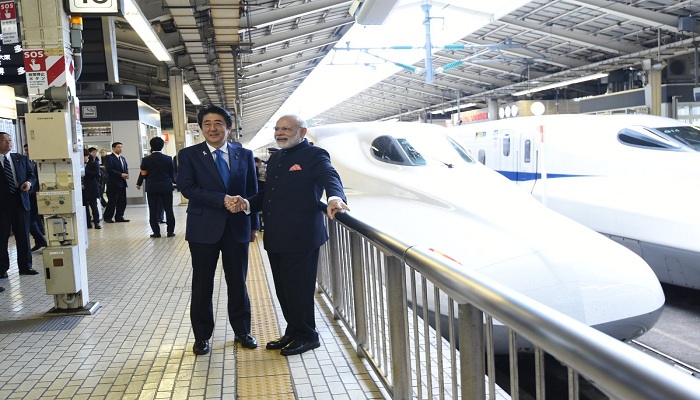
Prime Minister Narendra Modi and Japanese Prime Minister Shinzo Abe on Thursday laid the foundation stone for India’s first ever bullet train project. Japan International Cooperation Agency and the Union Railway Ministry have inked a memorandum of understanding for the ambitious project between Mumbai and Ahmedabad.
Here is all you need to know about the much-awaited bullet rail project:
1. The estimated cost of the 508 km project is pegged at around Rs 1.10 lakh crore.
2. Japan is giving a loan of Rs 88,000 crore for the project at a minimal interest of 0.1 per cent.
3. The government wants to start the services of the proposed Ahmedabad-Mumbai High Speed Rail Network, commonly known as the bullet train on August 15, 2022 to mark India’s 75th year of Independence.
4. The bullet train would run at an average speed of 320 km per hour and at a maximum speed of 350 km per hour.
5. It will stop at 12 railway stations on the route but only for 165 seconds each.
6. A 21-km-long tunnel will be dug between Boisar and BKC in Mumbai, of which seven km will be under water.
7. The railways will only require around 825 hectares of land for the project as 92 per cent of the route will be elevated, six per cent would go through tunnels and only the remaining two per cent would be on the ground.
8. The railways would run about around 35 bullet trains when it starts operation with about 70 trips per day.
9. The number of trains would be increased to 105 trains in 2050.
10. Initially, the train would have 10 coaches with a total seating capacity of 750 passengers.
11. Later, it is proposed to have 16 coaches with a seating capacity of 1,250 passengers.
12. The train would have two categories of seats–executive and economy–with the prices comparable with the base AC two-tier fare of the Rajdhani Express.
13. In the initial days, around 1.6 crore people are expected to travel by the train annually.
14. By 2050, around 1.6 lakh commuters would be travelling by the high-speed train on a daily basis.
15. The train would require a cleaning time of four hours, after running for 20 hours.

Post Your Comments